“The question of what kind of city we want cannot be divorced from that of what kind of social ties, relationship to nature, lifestyles, technologies and aesthetic values we desire. The right to the city is far more than the individual liberty to access urban resources: it is a right to change ourselves by changing the city.”
David Harvey, New Left Review 53, September-October 2008
We approach the door in an awkward, circumlocutory manner- we knock – the sounds of an unwrapped heavy chain – a friendly face welcomes us in. Obligatory gleeful greetings – wading through my nervousness to from…impressions – I see a day plan stuck up by the door – the first thing today was a meeting of the ‘Owen Jones Appreciation Society’. [1] Gulp. Owen Jones seems… very nice, like, really nice, but a whole appreciation society? And of all the things to have going on in squat that openly and explicitly declares itself as an adversary of the status quo, does it seem vita to host the Owen Jones Appreciation society on the third day? Scanning the rest of the day plan, I see that 17:00 to 19:00 is the Safe Space Fight Club… Wait, what? Now that does sound incredibly exciting, but how would it work? The person who let us in is still standing at the now re-secured front door, and notices my incredibly confused series of expressions. “Oh, hahaha, don’t worry about that! That’s if the police pass by again they’ll think there’s a lot going on. We want them to think the place is busy as we’ve kind of had a skeleton crew here while the demo is on. Actually, there really was this 3 hour safe space meeting yesterday. I went cycling.” I laugh, and relax little. It has already been a long day.
I’d taken part in the Saturday 20th June Anti-Austerity demo organised by The People’s Assembly, a march to Parliament square where there were the usual speeches. It a great day out but much to my chagrin all the tourist attractions and shops remained open. I’d come up to London with 20 or so of the people associated with Radical Bank, and when someone at the demo told us another Social Centre had sprung up, days before our violent eviction from an old branch of Barclays in Brighton, our curiosity was uncontainable, and we seized the opportunity to visit.
Once inside I wondered about the place. It feels like a pub with no staff, or a very relaxed house party. The counters are lined with all kinds of skipped food, and there are 40-50 people talking convivially. On looking around a bit more, I find a board covered with a3 paper- these are organisational maps, listing places that are good to skip or useful phone numbers; a few regulations that have been agreed upon; a to-do list; and groupings of initials on different rota’s, showing who has volunteered to do what. On part of the bar there lots of different zines, stickers, all kinds of information. I notice this flyer, it has this picture of a cute little elephant opening a squat with a crowbar, with several people holding hands and following. I find it an immensely reassuring image, and day-dream about one of the local monuments coming alive to help people who live near-by in any it can.
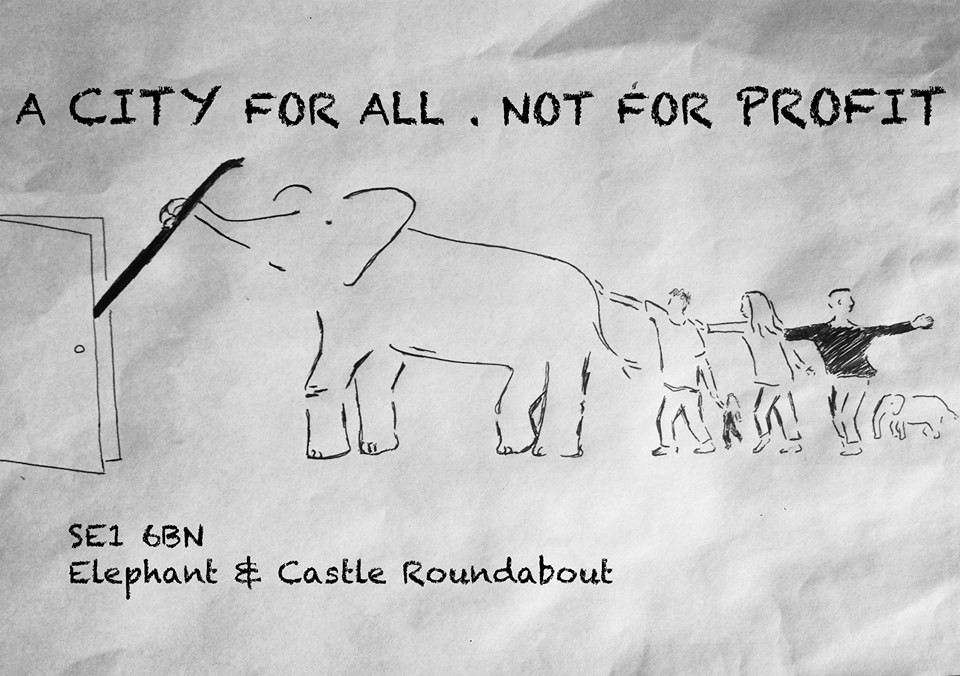
My thoughts wonder to our geographical context: Some things about the area of Elephant and Castle are well known, but walking around you see all kinds of architectural traces of secret histories -different modes of urban-structuring and entertainments jostle for your attention- any kind of straightforward rendition of its history feels inadequate. There are relics: The Coronet, across the road from the Social Centre opened in the thirties, and is seemingly running now as some kind of nightclub. Doesn’t this trajectory seem almost absurd? There is also much missing from the landscape, like the Heygate Estate, the now demolished Brutalist masterpiece that was built in 1974. It was conceived then as thoroughly modern answer to the housing shortage, and once made became a home to over 3000 people. Like so much affordable housing, after years of enforced impoverishment, it was demolished.
The Elephant & Castle pub itself – located at SE1 6BN, on the E&C Roundabout– was a public house for 250 years. It was closed for over a year when it was announced the building would become another branch of Foxtons, the estate agents who are basically gentrification-doom-incarnate. A bunch of people were real mad that when social housing is most needed, developers have closed in to make luxury flats.
That’s one of the reasons I see squatting and/or occupations as so important in the contemporary urban environment. One of the first lines of defence against the destruction of our homes, communities and social spaces is seizing the space that is rightfully ours. Out of this can be born hubs for all kinds of community work and activism. All squatting is political, for sure, even if it’s only driven by survival and understandably kept under the radar, but there is a special chaotic energy to opening a disused building, inviting people in, and then asking them ‘What would you like to see happening in this space?’. Not that it’s a complete free for all: there are a few of what seem to be core beliefs: Someone at E & C told me that they are all united around several causes, particularly universal housing, free education and an end to racist violence and scapegoating. Not that they claim any privileged knowledge about these issues, just that the intention in opening the space was to amplify and supplement existing struggles, to generate as much participation as possible. This all sounded good to me, but I wanted to see how their action held up to their theory, and decided to hang around for a while, to share, help, and learn as much as possible.
The Raid
On the 21st of June there is meant to be a general assembly. However, only 3 people are here, dreamily making banners. I ask them, where is everyone? They tell me “a raid is on, round the corner on East Street’. It turns out a ‘migrant raid’ by the UK Border Agency is to happening, and a large group have gone to help resist it anyway they can. We decide to clean the space, and cook for them, knowing that challenging the state-monopoly on terror and violence is bound to leave people a little shaken, and maybe hungry. When they get back they tell us that it’s going well, they stopped the van, and that they had been supported by loads of people in the community. It was hoped whoever was snatched would be released. Unfortunately, quite a few cops turned up, armoured in riot gear, with attack dogs. Eventually, the UKBA got away with their intended victim, and someone else had been arrested. Now it was our job to find them and try and get them out. All out assault on detention centre seemed out of the question, so we concentrated on trying to find our friend who got arrested. This proved very hard as the police wouldn’t admit to arresting them, -they effectively disappeared them, so that night many of us gathered at Walworth police station, on arrest support, working under the assumption that it’s the police station in the nearest vicinity to East Street. The police choose not to react to our impromptu protest, (apart form threatening to arrest us, obviously) probably for fear of escalation. Much of how the police operate nowadays is based on erasing the most obvious signs of repression; they don’t usually want anything like a riot on their hands.
At the station desk, questions are fired at the officer on duty, including, ‘have you killed him and left him somewhere?’ to which they replied ‘don’t be ridiculous’. My friend said, ‘of course the mind jumps to conclusions when you won’t tell us anything, especially with the history of police deaths in custody, and against people of colour.” Eventually, at 4am, an officer arriving at the station is harangued, and lets slip they do have our friend locked away. We ask solicitors to again pressure the police to finally admit they have our friend, and we’re eventually able to talk to the arrestee on the phone, and it is a wonderful relief. ‘Arrestee Support’ continues for a few nights; there is dancing, singing and all kinds of mischief. Eventually our friend is released.
Afterwards, I think to myself that it can’t be unrelated to the raids, that the powers-that-be have a vested interested in intimidating everyone currently living there to move out of the area. A lot of resources are been poured into trained, armed squads stealing people from their homes without warning. Of course, migrants are a trusty scapegoat, but surely the kidnappings can’t be unconnected with ‘regeneration’ project, budgeted at £1.5 billion, approved by Southwark Council in 2004?
Social Movement in the Unreal City
E and C isn’t alone on these particular front-lines of activity: hundreds of occupations happen in London all the time, and quite a few social centres have been tried all over the country. [2] There is a very strong movement of Social Centres in mainland Europe, particularly Italy and Spain. On Monday June 29th I went to one of the many talks, seminars, and skill shares at the E & C. This one was about the Social Centre movement in Italy, and I hoped it would help place the project within an international context.
When I got there, and caught up with a few people, someone mentioned that the speaker would need a tiny bit of help with his English. I volunteered my friend who was visiting with me to translate – to which they of course cried “I’m no translator! Translating is incredibly difficult!” – but we were assured that it would only be a few words of the talk, so under duress my friend agreed.
Inevitably, the speaker did the whole thing talking in pure, uncut Italian, yet my friend somehow did a perfect job of translating the whole thing. Tons of traffic passed around the building, and the room was sweltering, so the whole talk was kinda subjunctive, but I emerged with this rough impression-
Apparently squatting in Italy is illegal -and st approached as disruptive & productive process, but it’s different to the UK – they said in Italy there is the atmosphere of more explicit corruption – that there are no spaces at all for young people, that extreme situations demand extreme remedy -or maybe I imagined them saying that bit-. In Italy there is organised crime, whole towns you couldn’t set-up in because the mob would fear you would steal vital resources from them: impressionable young people – the speaker said, yes, you often have more of a threat form the anti-state than the state itself – in fact Social Centres are often responses to fascist activity – to self-branded fascists of the new millennium, for instance-
I think to myself, the elites seem to be encouraging all kinds of fascism in the UK, maybe in the next Social Centre I’m a part of I should try and make resisting the rising tide fascism an explicit aim, and ask some local anti-fascists if they want to co-operate with us in some way.
-Fried pancakes and vegetables go around, – a dog wonders in and out of the circle (someone wryly suggests it’s secret agent, that has been sent here to disrupt by constantly trying to eat our food)
I’m trying to figure out if Social Centres can ever really defined. The speaker says it’s about making Autonomous spaces. Someone asks, What does that mean?
A friend of the speaker ventures instead “it’s about Class Warfare”
Class Warfare? Maybe…That word class always used to bother me, because it seemed too rigid a word, too irrevocably dated. I’ve now come to understand class in a looser, more productive way: that you can think of it as a sense of entitlement, reflected in how you go about problem solving, or your expectations from different situations; that class manifests as where and what your breaking points are. But we’re equals parts acceptance and resistance to our conditioning, our socialisation, and class sometimes seems too complicated to politically galvanise around; it can’t be separated from race, from geography.
And what about gender in these spaces? What about challenging structural male supremacy? There hasn’t been an official Safe Space policy in place the whole time I’ve been coming to E & C. I get into a talk with a friendly activist I’d noticed around before, about the idea of safe space. I’m unsure of its validity, but I find myself unable to articulate a clear account of why. I realise, rather than trying to explain it to them, I should of just asked them to explain how they felt about it to me, and then listened. My trying to convince of my point is no doubt tied-up with the fact I have been socialised as a man, with all that entails: a licence to talk over others, to deride them, an ingrained desire to dominate. Upon this reflection I decide that making safer spaces is absolutely essential, even if I still find the framework problematic in all kinds of ways. [3]
It’s impossible to be complete unified, and divisions of all kinds are to be expected. To critique these things openly is the healthiest option. For instance, at E & C, there are sometimes disagreements, – so me seem to have clear objectives that don’t allow for the inevitable day to day chaos that comes with running such a place, while some people who are passing through can’t seem to deal with the fact that people working there want clean, relatively stress-free environments. From experience, running such a place is exhausting, and you can end up feeling justified using the rhetoric of ‘us, the people who actually run this place’. We aren’t absolutely responsible for the world we bring in with us, and these few criticisms should in no way infringe from our overall feeling of amazement and joy at the possibility of such projects.
accelerated time – kindness – desperation
Cities and the encounters they intimate are partly expressions of the drive of capital, and includes torsions and contradictions, dislocations in time. The very intense proximity of the dense urban environment, thick with social relations, means that when a squat is opened, and anyone can come in all kinds of bonds and ties can form that radically challenge dominant hegemonies.
These encounters can be powerful, and I’ll leave you with two
I was leaving to go back to Brighton, for I don’t know how long, and my last night at the squat I was with Chole again, who had spent 6 years at Heygate, and was shoved somewhere else for 3 years, and was then evicted and left with nowhere. She has been staying with a friend, but tonight can’t get hold of her, so she’s at E & C. She tells me only jesus stopped her from murdering the people who did this to her. I can’t help thinking, maybe she should of, and then instantly feel awful for this thought. I guess it seemed at that moment, as I made we made tea, that the people who evicted her might as well of being trying to kill her, and to return that in kind would make them think twice about trying it again, and again, and again.
Someone I speak to in the morning, right before I leave, is Walt. I’ve seen him around a lot, although he doesn’t seem to talk to anyone much, and keeps to his own idiosyncratic world. After listening to him talk for a while, I ask him if he was originally American? Walt says ‘I’m still American! I came here in 69, and the more roots you grow the harder it is to leave. I was a journalist, I went a lot of places, spent a lot of time in Bangkok. The partner I had produced a son, so I couldn’t spend all my time in Bangkok’ what did you write? ‘you had to be versatile back then!’. I ask Walt, how the hell did he end up here? What is he going to if the squat is evicted after the court date on Thursday, he tells me “As long as there is squatting, I’ll squat!”
Old friends and new hanging out at E & C
jo vile
——————————–
[1] For those that don’t know, Owen Jones is this young socialist-type, inside the labour party. He really does seem so lovely, but, he insists we need to get behind, even get inside the Labour Party, to which I would reply ‘LOL!’, if it wasn’t so distressing that people who should know better can actually think that
[2] Stuart Hodkinson. Paul Chatterton. (2006). Autonomy in the city? Reflections on the social centres movement in the UK. City, 10 (3). p305-315
[3] As well as my experiences of safe spaces, both good and bad, I was trying to draw some fantastic, essential analysis I read recently: http://anonymousrefused.tumblr.com/

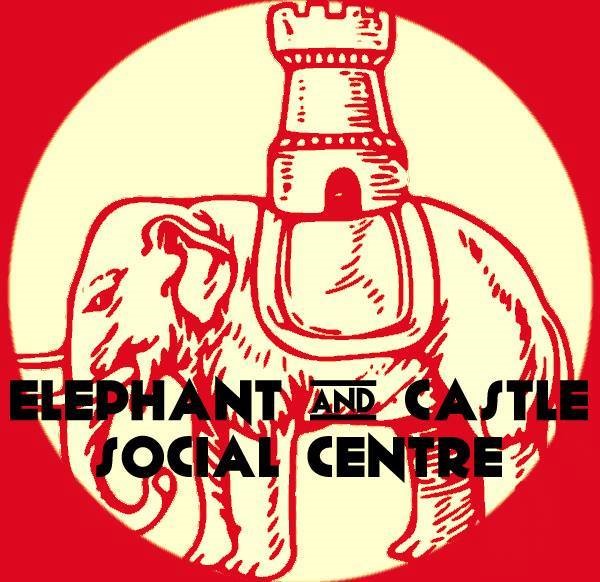

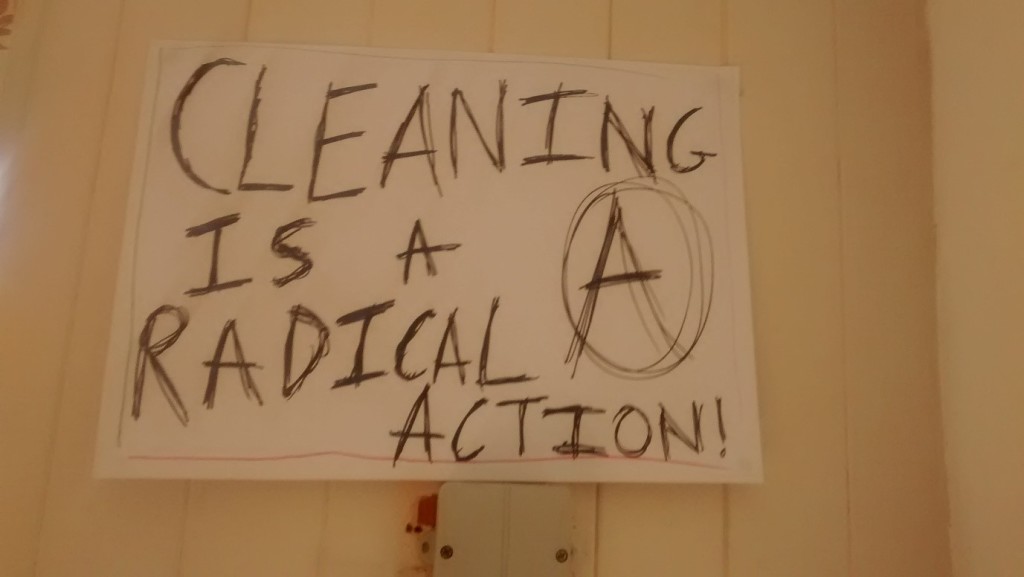
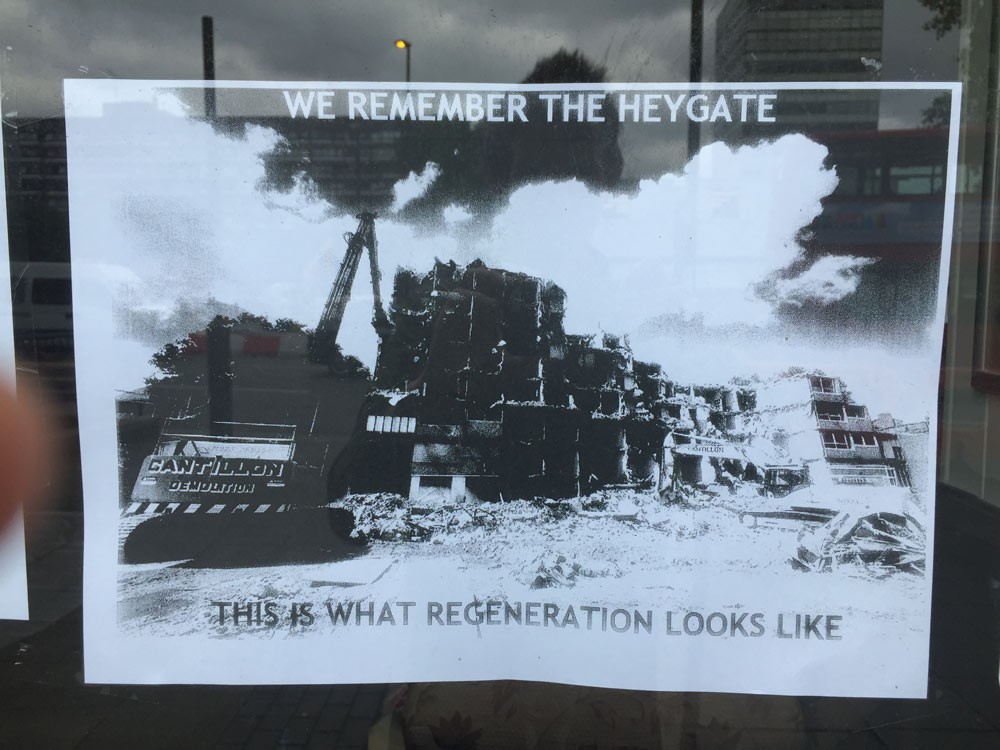
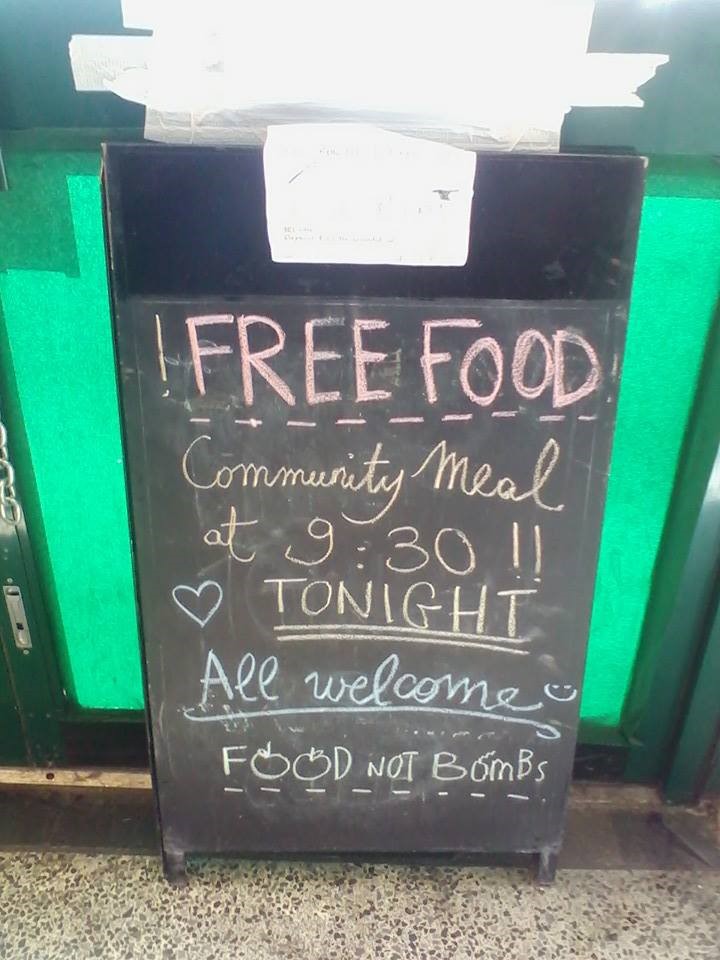
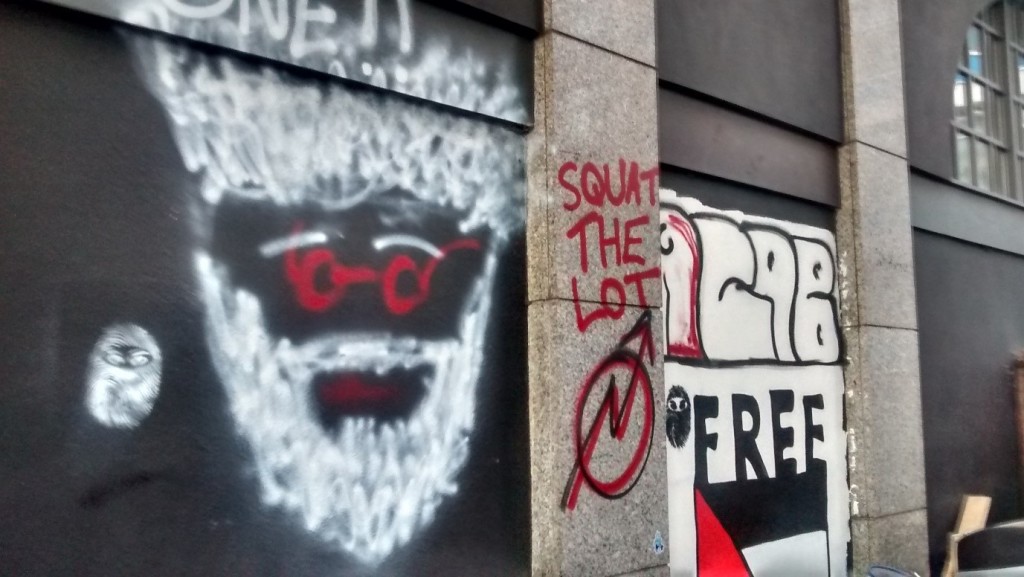
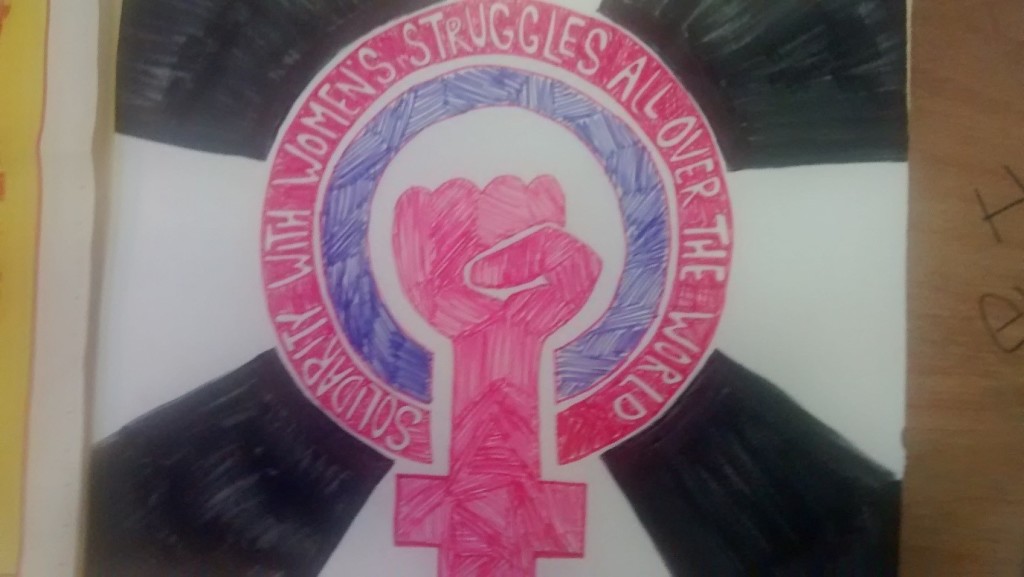
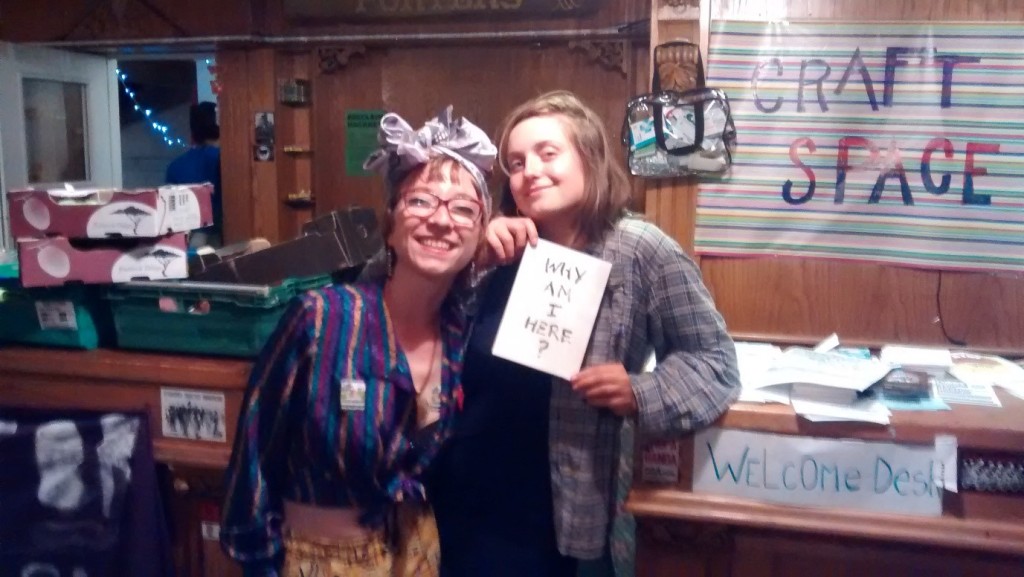
The PDF of the compendium — now historical — called “What’s this place?” is available online at:
Comment by Alan W. Moore on 4 July, 2015 at 10:41 pmhttps://socialcentrestories.wordpress.com/